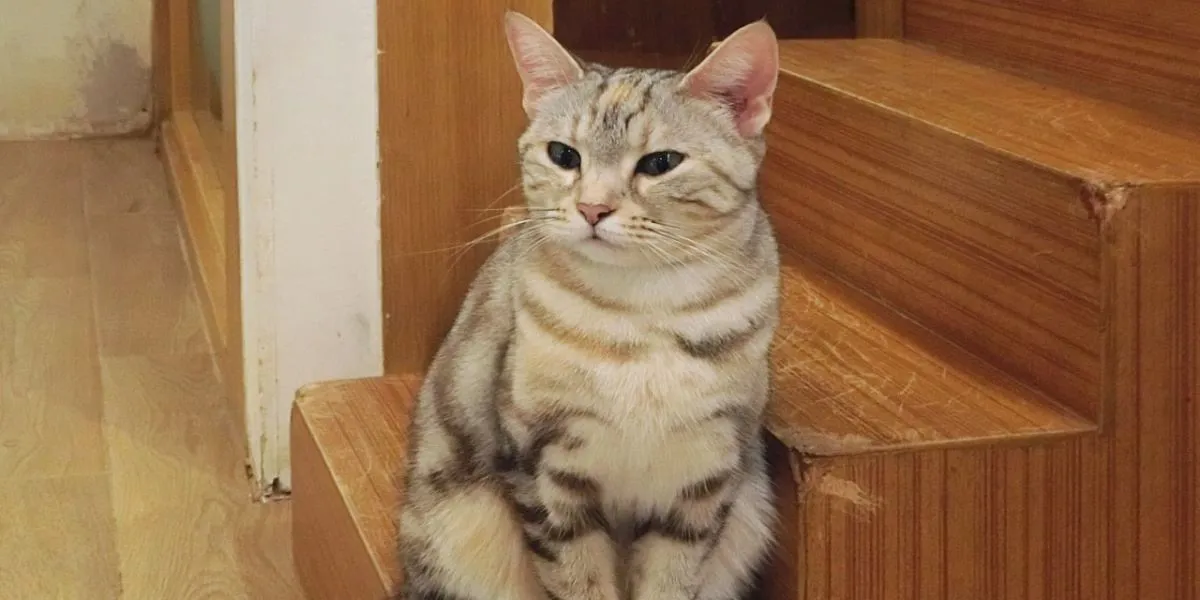 Curious cat cautiously exploring a staircase
Curious cat cautiously exploring a staircase
Cats communicate in fascinating ways, from soft purrs to enthusiastic chirps, but meowing is one of their most recognizable sounds. If you’re wondering, “Why is my cat not meowing?”, you’re not alone—many cat owners notice this behavior and worry about their pet’s health. While some cats are naturally quiet and rarely meow, a sudden silence can signal underlying issues like stress, illness, or laryngeal problems. Understanding the reasons behind a cat not meowing helps you determine if it’s normal feline personality or a vet visit in order. In this guide, we’ll explore common causes, red flags, and steps to take, drawing from veterinary insights to keep your cat healthy and happy.
Key Takeaways on Cats Not Meowing
Naturally quiet cats who have never meowed much are usually fine, especially if they’re otherwise playful and eating well. A sudden stop in meowing, however, often points to health concerns like infections or inflammation in the voice box—always consult a vet promptly. Most silent cats still vocalize through purring, trilling, or chirping, maintaining their unique communication style.
Is Lifelong Silence Normal for Your Cat?
Not all cats are chatty; some prefer a whisper over a meow from kittenhood. If your cat has never meowed despite living with you for years, this is often just their personality shining through. Breeds like the Scottish Fold or certain Orientals might be less vocal, opting for subtle purrs or chirrups instead.
These quiet kitties are typically content and healthy, showing no other signs of distress. They interact through body language, rubbing against your legs, or gentle head bumps rather than vocal demands for attention. As long as your cat eats normally, uses the litter box regularly, and engages in play, a lack of meowing isn’t cause for alarm. Veterinary experts, including those from the American Veterinary Medical Association (AVMA), confirm that individual temperament plays a huge role in feline vocalization patterns.
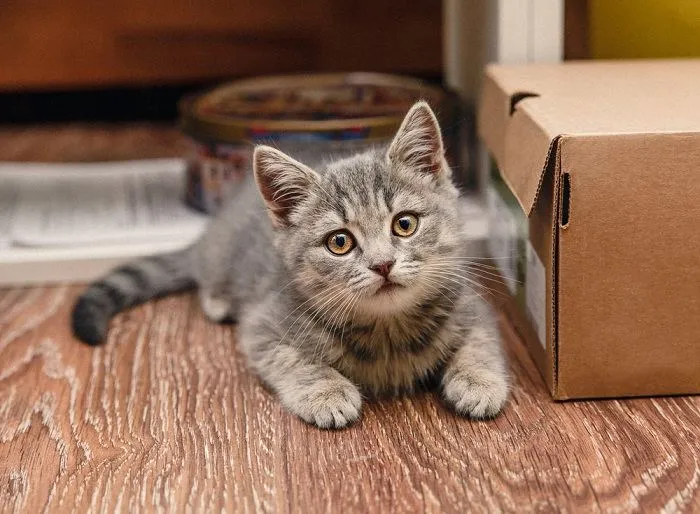 Energetic cat with tail swishing in motion
Energetic cat with tail swishing in motion
However, monitor for changes in overall behavior. Quiet cats still need annual check-ups to rule out silent health issues like early kidney disease.
Sudden Silence: When a Meowing Cat Goes Quiet
If your formerly vocal cat suddenly stops meowing—or their meow turns hoarse or raspy—pay close attention. This abrupt change often accompanies other symptoms and warrants a vet exam. Common signs include lethargy, reduced appetite, sneezing, nasal or eye discharge, excessive thirst, or hiding more than usual.
Veterinarians emphasize that the larynx (voice box) is key here. Any disruption can mute meows, and early detection improves outcomes. Track symptoms in a journal, noting when the silence started and any recent household changes like new pets or moves.
Common Medical Reasons Your Cat Stopped Meowing
Stress and Environmental Changes
Stress is a top culprit for cats not meowing suddenly. Cats are sensitive creatures, and disruptions like a new baby, house guests, moving furniture, or introducing another pet can trigger withdrawal. Stressed cats become less interactive, skipping meows for attention and retreating to quiet spots.
Inter-cat tension is common; if your resident cat blocks a newcomer from resources, vocalization drops. Signs include flattened ears, tail swishing, or aggression. To help, provide multiple litter boxes (one per cat plus one extra), separate feeding stations, and Feliway diffusers, which mimic calming pheromones per studies from the Journal of Feline Medicine and Surgery.
Upper Respiratory Infections (URIs)
Viruses like feline herpesvirus or calicivirus cause URIs, leading to throat inflammation that hoarsens or silences meows. You’ll spot sneezing, runny nose/eyes, coughing, and fever. These are highly contagious in multi-cat homes, so isolate affected pets and boost humidity with steam from a hot shower.
Antibiotics may treat secondary bacterial infections, but supportive care like fluids is key. The Cornell Feline Health Center notes most cats recover fully with prompt vet care.
Laryngeal Problems
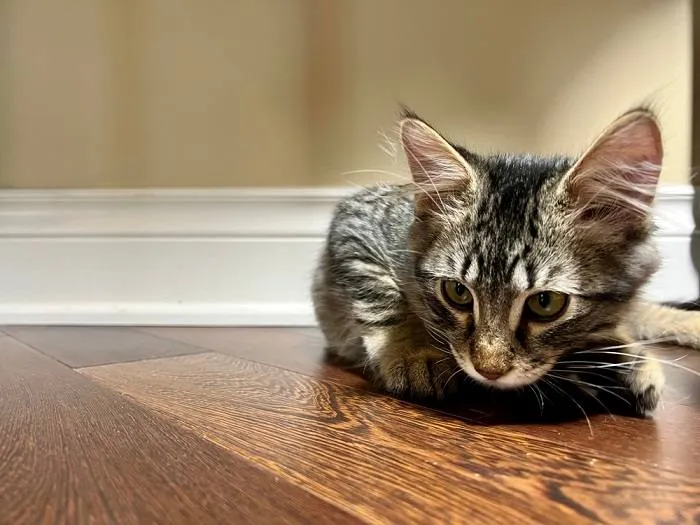 Attentive cat with a single ear raised, displaying curiosity
Attentive cat with a single ear raised, displaying curiosity
The larynx, vital for meowing and preventing food aspiration into lungs, can inflame (laryngitis), paralyze, or develop tumors. Laryngitis from infections or irritants is most common, causing hoarse or absent meows. Paralysis affects nerve function, while rare cancers impact older cats.
Diagnosis involves laryngoscopy or imaging. Treatment ranges from anti-inflammatories to surgery, with vets like those at the ASPCA Animal Poison Control Center highlighting inflammation as reversible if caught early.
Cancer or Systemic Illness
Though less common, throat tumors can obstruct vocal cords, especially in senior cats. Systemic diseases like chronic kidney disease, diabetes, or hyperthyroidism cause overall lethargy, reducing meows. Bloodwork and ultrasounds confirm these; early intervention via diet or meds extends quality life.
General Lethargy from Illness
Any malaise—pain, nausea, or fatigue—quiets cats. Watch for weight loss, vomiting, or diarrhea alongside silence.
Home Monitoring and Support Tips
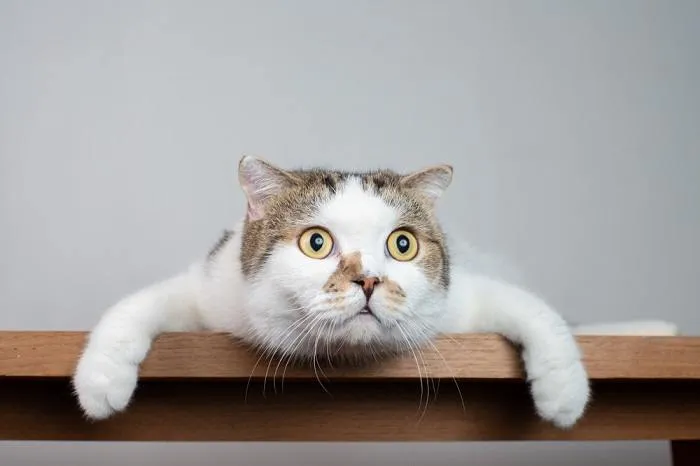 Wide-eyed cat in a state of surprise or alertness
Wide-eyed cat in a state of surprise or alertness
While awaiting a vet visit, observe closely: Note appetite changes, hydration, litter habits, and energy. Offer soft foods if swallowing hurts, ensure fresh water, and minimize stressors by maintaining routines.
For suspected stress, enrich the environment with vertical spaces, toys, and play sessions. Avoid forcing interaction, as it worsens anxiety.
When to Rush to the Vet
Lifelong quiet cats need no intervention if thriving. But sudden meowing loss, voice changes, or symptoms like discharge, lethargy, or appetite loss demand immediate care. Vets may run blood/urine tests, x-rays, or scopes to pinpoint issues.
Per AVMA guidelines, err on caution—untreated URIs or cancers worsen fast.
Conclusion
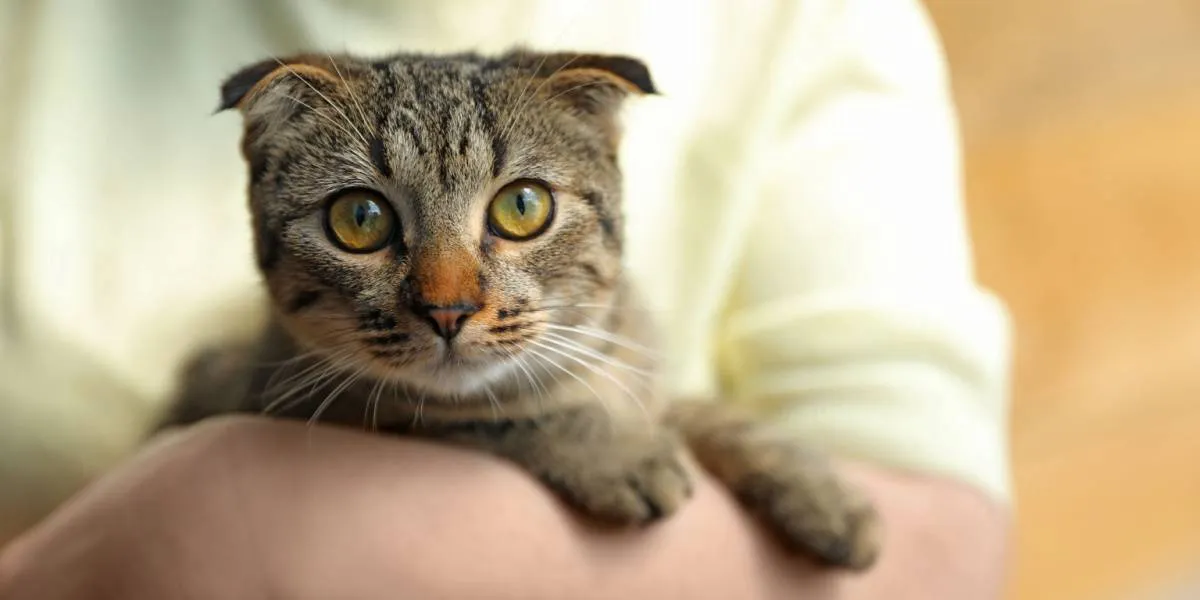 Captivating Scottish Fold cat showcasing its unique folded ears
Captivating Scottish Fold cat showcasing its unique folded ears
A cat not meowing can stem from quirky personality, stress, or serious health like infections or laryngeal disease. Celebrate quiet charm if longstanding, but investigate sudden changes to safeguard well-being. Regular vet visits, stress reduction, and vigilant monitoring ensure your feline friend thrives.
Share your cat’s story in comments, and consult a local vet for personalized advice. For more on cat health, explore our guides on respiratory issues and behavior.
Frequently Asked Questions
Should I Worry If My Cat Stops Meowing?
Not if they’ve always been quiet and healthy. Sudden stops need vet evaluation for infections or other issues.
Why Would a Cat Stop Meowing Suddenly?
Causes include stress, URIs, laryngitis, cancer, or systemic illness like diabetes.
Why Is My Cat Suddenly Quiet and Not Meowing?
Stress, feeling unwell, or voice box problems. Vet check recommended.
Can Stress Cause a Cat Not to Meow?
Yes, stress silences vocal cats; address with resources and pheromones.
References
- American Veterinary Medical Association (AVMA): Feline Vocalization Guidelines
- Cornell Feline Health Center: Upper Respiratory Infections
- Journal of Feline Medicine and Surgery: Stress in Cats
